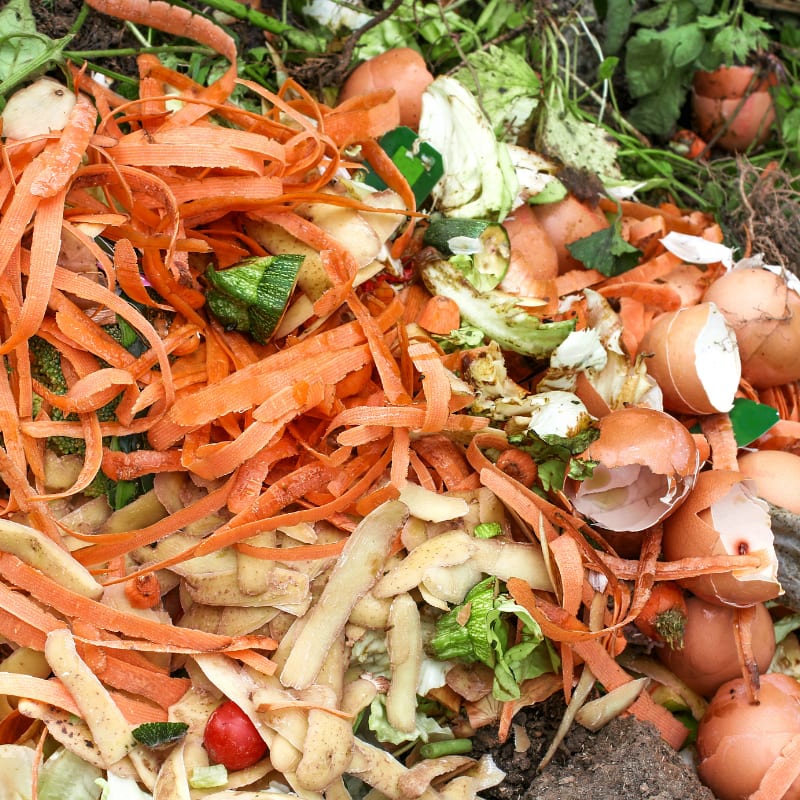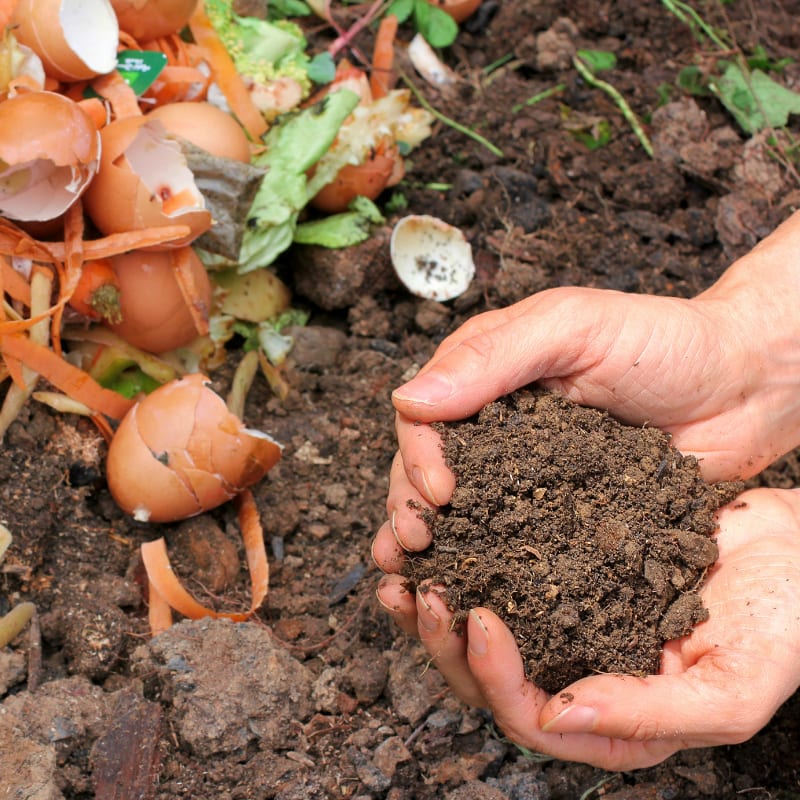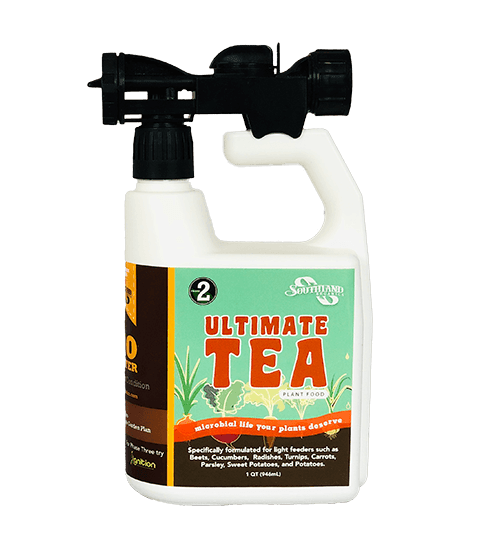Since the dawn of time, farmers and gardeners have used this rich decanted brew, also known as compost tea, as a liquid fertilizer. It’s just called compost “tea” because of its typical dark color and the fact that we brew it into existence. Don’t drink compost tea. It won’t do you any good, and compost tea tastes terrible. Please don’t ask me how I know...
Many garden enthusiasts have at least heard of the wonders of compost tea and other organic fertilizers. It is easy to find many compost tea recipes online as well as thousands of tips and tricks. If you search Amazon or eBay to buy compost tea, you will certainly find many contraptions and devices to help you brew a batch of compost tea. There is a ton of buzz online about compost tea and other organic fertilizers for good reason—the benefits of compost tea and its beneficial microbes are numerous.

Beneficial Microbes = Healthy Soil
Compost teas work quickly and efficiently. Usually applied as a foliar spray or foliar feed, they are sprayed directly onto plant leaves during critical times, such as heat stress or root damage, to quickly help with the healing process, plant growth and strengthen your plants from the top down. Compost tea can also be applied as a soil drench around the root zone.
The superpower of compost tea is its beneficial microbes. These beneficial microbes make compost tea capable of helping crops and gardens fight disease and absorb more nutrients. With organic matter, compost tea replenishes the missing biology in the soil so that plants have all the nutrients and organic matter they need to thrive. Healthy soil is living soil!
Compost tea applications can even reduce the need for synthetic fertilizers because it helps plants utilize nutrients more effectively. Reducing the use of synthetic fertilizers comes with benefits for healthy soil because they can kill the beneficial microbes found in compost teas and naturally in the soil. So the less synthetic fertilizers you use, the more beneficial microorganisms you will have in your soil whether or not you make compost tea applications yourself.
Benefits of Compost Tea
- Compost tea applications improve plant growth by protecting plant surfaces
through competitive exclusion

- Compost tea improves plant growth by improving nutrient retention in the soil
- Compost tea improves plant nutrition by increasing nutrient availability in the root system
- Compost tea applications reduce the negative impacts of chemical-based pesticides, synthetic fertilizers, herbicides and fertilizers on beneficial microorganisms in the ecosystem
- Compost tea improves the uptake of nutrients through foliar uptake
- Compost tea applications improve soil health and structure
- You can use a home brewing process or buy a product that serves the same purpose
Challenges of Compost Tea Brew
- The nutrient content of each type of compost tea will be different
- The microbe content of each type of compost tea will be different
- The brewing process for compost tea is a messy, time-consuming and often odorous undertaking
- If you don't buy a products that serves as a compost tea from a reputable, reliable source, it can be dangerous
Compost Tea Brewing Process- How it can Go Wrong
Compost tea is great; however, if you want to make compost tea, so many things can go wrong in the brewing process. Compost teas are made by extracting beneficial microbes and nutrients from organic matter by soaking them in water. But unlike the tea you drink, it isn’t only what's in the compost tea bag that matters. The brewing process is just as important, including brew time, temperature and many other variables. These can radically affect the benefits, quality and reliability of an organic compost tea brew. Getting it wrong when you make compost tea can make it toxic.
Harmful Bacteria in Homemade Compost Teas
You may go through all the trouble to make compost tea home brewed, but if some sneaky bacteria, virus or mold gets into the process, then your compost tea brew will have it as well. The reality is that along with the beneficial microbes, you might also be growing harmful ones when you make a compost tea brew. You could be growing bacteria in the compost tea that will make you or your plants sick or harm plant growth. These possible contaminants in the compost tea brew will not only be of no benefit to your plants, but can kill them!
Think about what you are doing when you make compost tea brew. You are creating an incubator for microbes. You are providing the moisture, the food, and the right oxygen levels to grow organic matter like bacteria. But which microbes are you growing in your compost tea? You have no way of knowing. The process for when you make compost tea is not selective—you grow whatever is in the pot. Aerated compost tea can contain Salmonella and E. coli, both of which can prove to be deadly to humans.
After All, Compost Tea comes from Compost...

Still think you want to make compost tea on your own? Here is more information to help you decide.
A quality home brewed compost tea would theoretically begin with a quality compost. But in actuality, this is where the challenge begins.
Composts are highly variable in composition. They start with water, carbon and nitrogen supplied by decaying organic matter, which is a source of other macro and micro-nutrients, such as amino acids, sugars, beneficial microbes etc. The content of these ingredients can vary widely.
For example, the quality of animal manure alone varies tremendously according to:
- The species and age of the animal it comes from
- How well decayed or how old it is (Carbon / Nitrogen ratio)
- The diet of the animal
Plant materials vary primarily due to:
- The kind and age of the plant
- The nutrients (fertilizers) taken up by the plant
- The presence of symbiotic nitrogen-fixing microbes
- The presence of volatile oils, auxiliary substances, and other plant exudates
You can see why the results of these variations can be quite substantial if you want to make compost tea.
Even under ideal conditions, the chemical and biological properties of compost will vary according to how long it decays. Younger compost is closer to the original raw materials than well-aged compost. As compost ages, it converts sugars and carbohydrates, (which many disease organisms prefer as food) into starches (which beneficial microbes prefer).
The level of decomposition of the source material used in a compost tea will affect the length of time it needs to brew. Theoretically the longer the compost tea “brews," the better it will be, except that within a few days (unless carefully aerated) the mixture will go anaerobic, meaning there is little to no oxygen within it. Beneficial microbes in the slurry pull all the oxygen out of the water. This oxygen deprivation turns over the production of the compost tea to oxygen avoiding (anaerobic) bacteria, which produce an inferior compost tea with fewer available nutrients and organic acids that are harmful to plant growth and healthy soil. Beneficial microorganisms can turn harmful if they become anaerobic!
So here are the real dangers that can happen to your home brewed compost tea. Harmful bacteria, viruses and molds can potentially populate your compost tea, which is not only a threat to your healthy plants, but your healthy soil, pets and family.
Keep it simple and safe- Buy a product that serves as a compost tea
The easy way to get the full benefits of a compost tea without the fuss and risk is to buy a product that serves the same purpose as a compost tea instead of making it. You can buy compost tea on sites like Amazon and Etsy or from the websites of independent vendors. If you decide to buy a compost tea product, make sure you're getting it from a reputable source made commercially- not just someone else's home brewed compost tea! That will just defeat the purpose of buying a product.
You can buy compost tea in a liquid form or in tea bags in a powder form. We recommend liquid nutrients because this type of compost tea is easier to apply. You can add it to a spray bottle to spray it on plant leaves or fully cover the ground as a soil drench. When you buy a compost tea product from a reputable source, you reap the benefits of healthy soil, beneficial microorganisms, organic matter and healthy plants without having to rely on a good compost pile that may turn bad when brewing compost tea.
Ultimate Tea Garden Plant Food
If you're thinking you want to buy compost tea, consider trying our Ultimate Tea Garden Plant Food.
 Ultimate Tea is not a compost tea. It is a products that serves the same purpose that a home brewed compost tea would. It's a highly concentrated liquid that provides amazing results when applied to plants- healthy soil through organic matter and beneficial microorganisms, just like an idea compost tea you might make yourself. Ultimate Compost Tea is a combination of active carbon, liquid nutrients and beneficial bacteria. High in Cypress lignin, vegetative and marine carbon, Ultimate Tea Garden Plant Food brings a plethora of benefits to the table far outstripping what is made in any home brew compost tea.
Ultimate Tea is not a compost tea. It is a products that serves the same purpose that a home brewed compost tea would. It's a highly concentrated liquid that provides amazing results when applied to plants- healthy soil through organic matter and beneficial microorganisms, just like an idea compost tea you might make yourself. Ultimate Compost Tea is a combination of active carbon, liquid nutrients and beneficial bacteria. High in Cypress lignin, vegetative and marine carbon, Ultimate Tea Garden Plant Food brings a plethora of benefits to the table far outstripping what is made in any home brew compost tea. This composition delivers an important organic matter to your soil. Additionally, our compost tea product is cold water extracted, thereby conserving the indigenous beneficial bacteria, fungi, protozoa and nematodes essential for plant health.
Anaerobic tea is spoiled, it stinks and it is dangerous. Quality compost takes time and experience. Quality compost tea takes even more time and experience. Our easy to use formula lasts a long time and goes a long way.
Ultimate Tea is based on a process that cold water extracts organic acids such as humic acid and fulvic acid. This is the key as the end result is an amazing biologically active organic carbon. We then add a proprietary mixture of beneficial microbes that are ideal for plant health. When applied as a foliar spray on leaf surfaces, your plants will thrive. We sell this product in 2.5 gallon, 1 gallon and spray bottle sizes so it can be applied in a way that is most convenient for the user.
All in all, it's easiest and safest to buy a product that serves as a compost tea instead of making it yourself. We're partial to the product we make, Ultimate Tea, because we know it works and we know it's safe. Perfecting the composting process on your own is a worthwhile art and long-term process, so in the meantime we recommend using a commercially-made compost tea-like product such as Ultimate Tea.
If you have any questions, feel free to reach out to us at support@SouthlandOrganics.com. For more topics like this and more all-natural products, check out our full blog and YouTube channel.






